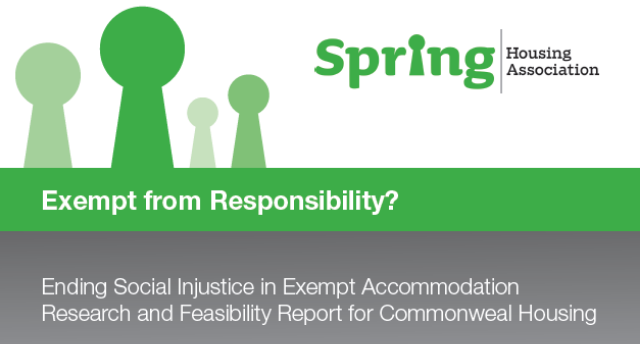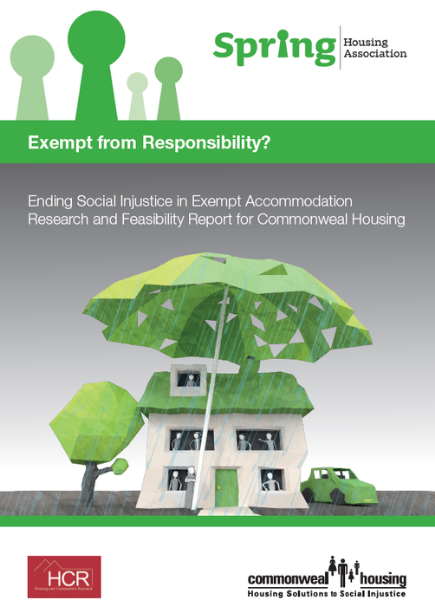
Thousands of vulnerable people living in ‘unregulated’ housing, report finds
An estimated 11,000 vulnerable people in Birmingham alone are living in potentially unsafe and unsuitable housing, according to new research published today. Nationwide, tens of thousands more vulnerable people will be living in this accommodation.
Exempt from Responsibility? reveals an ‘accountability deficit’ in non-commissioned exempt accommodation, which it defines as accommodation which is not commissioned by the local authority but is paid for using exempt provisions of Housing Benefit and Universal Credit regulations meaning landlords can access higher rent levels. The report focuses predominantly on shared units run by lease-based Registered Providers.
The report finds this accommodation has been left largely unmonitored and effectively ‘unregulated’ by Government. The Department for Work and Pensions (DWP) requires providers to meet only a loose requirement to provide ‘care, support, or supervision’ to its clients, and much of this accommodation is outside local authority licencing controls.
The research, published by Commonweal, Spring Housing Association and the Housing and Communities Research Group is based on analysis of Freedom of Information Requests, alongside interviews, focus groups and workshops with residents and providers.
It identifies a system where landlords can claim high rents with little accountability. This can lead to costly and unsafe environments in which residents receive support that is either too high or too low for their support needs. A lack of alternative accommodation means many are at ‘crisis point’ when they access this accommodation, and can be forced to accept unsuitable and expensive housing.
Vulnerable groups are more likely to be housed in this accommodation, including people fleeing abusive relationships, refugees and migrants, care leavers, rough sleepers, people facing mental health problems or substance misuse, and those in contact with the criminal justice system.
Many residents face barriers to employment as the higher rent levels charged become unaffordable for many when they find low paid, insecure work.
The report comes more than a year after the Ministry for Housing, Communities, and Local Government (MHCLG) and the DWP announced plans for a ‘robust oversight regime’ for supported housing.
The report calls for the oversight regime to address the ‘accountability deficit’, including by strengthening criteria in the Housing Benefit and Universal Credit Regulations, and giving stronger powers to the Regulator of Social Housing.
Ashley Horsey, Chief Executive of Commonweal Housing, said “Through support for this research Commonweal hopes to shine a light on a system that is absolutely meeting the immediate needs of some, but is causing real harm for too many others.
“Everyone accommodated in this sector is in need of a home. But this necessity should not lead to accepting poverty of standards, poverty of management or poverty of aspirations and opportunities.
Ashley Horsey, CEO, Commonweal Housing
“This report is a call for better information, regulation and scrutiny to ensure that ‘exempt’ housing is a legitimate and safe option for everyone who needs it. National and local Government must heed its recommendations, and address the accountability deficit in this sector once and for all.”
Dominic Bradley, Group Chief Executive of Spring Housing Association said: “Whilst the issues within non-commissioned exempt accommodation are by no means limited to Birmingham, we have engaged closely with residents, providers and practitioners in the locality to bring a ‘human face’ to a national system that is all too often leaving our most vulnerable on the margins.
“We firmly believe there is a place, and a need, for non-commissioned exempt accommodation. At its best, it acts as a true enabler to a safer and more independent life for our most vulnerable groups. However, at its worst, it is where ‘hidden’ homelessness manifests itself most sharply; in precarious housing conditions without appropriate services, support or security.
“We hope that this work continues to illustrate the need for more transparency, regulation and accountability and we will keep working with our partners at local and national level to ensure this sector does not cause harm to those it is intended to help.”
Dominic Bradley, Group CEO, Spring Housing Association
For any further enquiries about this report, please contact Thea Raisbeck at T.Raisbeck@bham.ac.uk.
For press enquiries, please contact conniem@commonweal.org.uk

